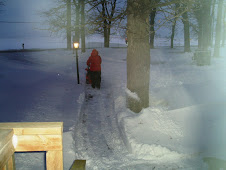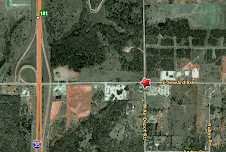During the war, the Ritchey Mansion served as headquarters for both North and South. The site of 2 Civil War battles, the Ritchey House was added to the National Register of Historic Places in 1978.
One of the bedrooms in the mansion has the floor painted black to cover the bloodstains from the room being used as an operating room during the war. Family states that during the time the room was used as an operating room, even the walls were painted black.
Confederate outlaw Belle Starr was imprisoned (or stayed) in Ritchey Mansion.
As with the entire southwest area of Missouri, Newtonia, was the center of some heavy fighting throughout the Civil War. Federal forces had a fort there and, as a result, the town passed back and forth between North and South several times.
Judge Mathew H. Ritchey, a prominent citizen in the area, was a Union officer (Colonel) and a slave holder. He built his home on property that butted up against the town's city limits to the southwest. His property consisted of the house, out-buildings, a stone barn and a gristmill across the road. A stone fence, often used as cover for soldiers, was on the south side of the property.
A yellow flag could often be seen waving over "a fine brick structure (the Ritchey House) used as a hospital" to protect it from the shells of the enemy.
The Belle Starr Legend
The story of Belle Starr (Myra Belle Shirley) at the Ritchey House is just one of the mysteries of her life. A few months after her death, Richard K. Fox, publisher of the National Police Gazette, published a "biography" of Belle Starr. Later, S.W. Harman, a friend of Judge Issac C. Parker, repeated the story in his book, Hell on the Border: He Hanged Eighty-eight Men (1898), and more recently repeated by Missouri novelist Homer Croy in his biography of Cole Younger, Last of the Great Outlaws.The early version:
On Feb 3, 1862, her 16th birthday, returning from a scouting action for her brother, Myra was riding through the village of Newtonia. Just 35 miles from her home, Carthage, she was intercepted by a Major Eno. Eno and his cavalry were stationed in the town; he was headquartered the Ritchey home.
On the day of her capture, Major Eno had sent a detachment of cavalry to Carthage to capture her brother, Captain Shirley. Myra, as she was known at that time, had ridden into that section of the country for the purpose of obtaining information that might be of value to her brother. When she heard about the planned capture of her brother, she rode off to warn him. Major Eno, who had once lived in Carthage, knew both her and her brother; he assumed she was about to go to her brother with information.
She was taken to a chamber of the Ritchey home and guarded by the major. In her anger she would shout loud curses, sit at the piano and pound out raucous selections. It was reported she would spring to her feet, stamp the floor and berate the major with all the ability and profanity of a trooper.
At last believing his men to have had plenty of time to reach Carthage ahead of her, Major Eno said: "Well, Myra, you can go now. My men will have your brother under arrest before you can reach him."
She ran to the door accompanied by the judge's daughter, cut seveal switches from a clump of cherry bushes for riding whips, saying, "I'll beat them yet." She sped away.
A short distance from the house she left the road and, leaping fences and ditches, headed straight for Carthage. The Major, watching through his field glasses, said, "Well, I'll be damned, she's a born guerrilla. If she doesn't reach Carthage ahead of my troopers, I'm a fool."
The Major was right; when his detachment entered Carthage, they were greeted by a girl, she dropped a courtesy and asked: "Looking for Capt Shirley? He isn't here left half an hour ago -- had business up Spring River. 'Spect he's in Lawrence county by this time."
In the second version, Homer Croy, writing about her adventure, recounts the story as passed down through the Ritchey family. Mrs. Mildred Graves Sanders, Ritchey's granddaughter-in-law related the following story. Local tradition seems to favor this version.
As a Union man, Ritchey was in the habit of sheltering Union soldiers and sympathizers. One evening in Feb 1863 he was surprised to see a young girl ride up to the house and dismount. It was unusual to see a girl this young unaccompanied.
"My name is Myra Belle Shirley and I live in Carthage," she said. "I've been visiting friends and got lost on my way back. Can I stay overnight?"
She was taken up to what was called the "black bedroom," because everything was painted that color. She had supper with the family; they enjoyed pleasant conversation. The Ritchey family knew of the Shirley family in Carthage, but did not like them due to their Southern loyalties. However, it is reported they seemed to enjoy Myra, who was making herself agreeable. One of the other guests at the house was Union Major Edwin B. Eno, of the 8th Missouri Militia, a cavalry regiment.
After supper the people went into the parlor where Myra sat down at the piano and played. Again she talked pleasantly and occasionally asked questions. She learned that the house was being used as headquarters for Major Eno and his officers, that enlisted men were using the stone barn and the stone mill as barracks, some of the men were encamped in Newtonia.
The next morning she came down to breakfast and again was most appreciative of the hospitality. After breakfast she said she would have to get home as fast as she could so that her parents would not worry about her. Her horse was saddled and brought.
"I want to get some switches for my horse." With Ritchey's daughter, she went to a clump of cherry bushes and cut off two or three. Then she walked slowly back to her horse and rode off in the direction of Carthage. She had gone only 2 or 3 miles when "hell struck the Ritchey House." The cutting of the cherry switches had been a signal to Confederate lookouts. A fusillade was launched against the house.
It was quite a little victory for Myra Belle Shirley.


















No comments:
Post a Comment